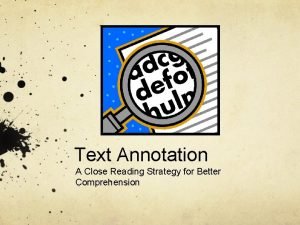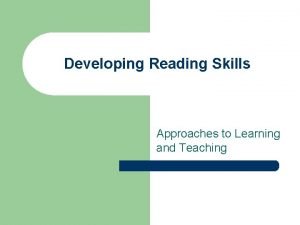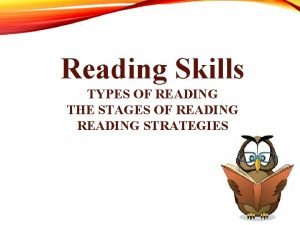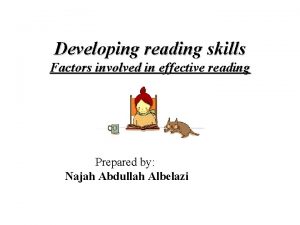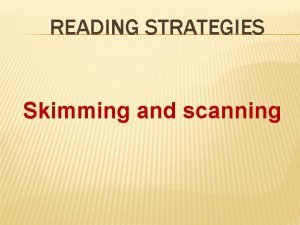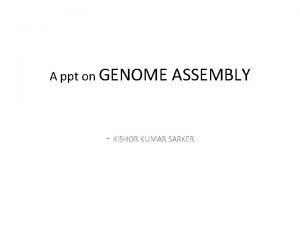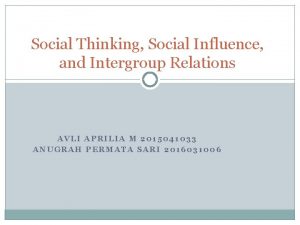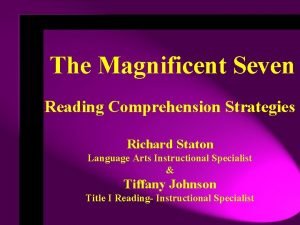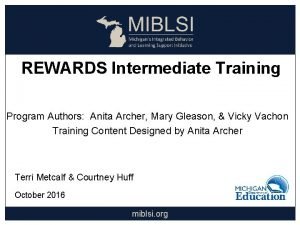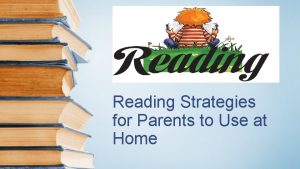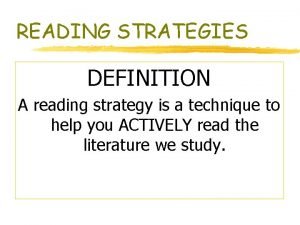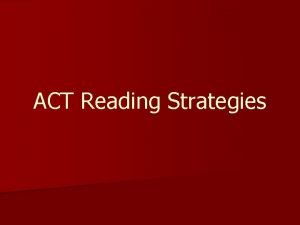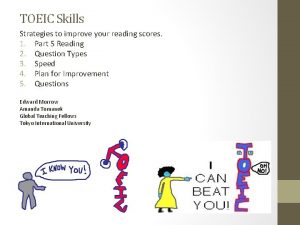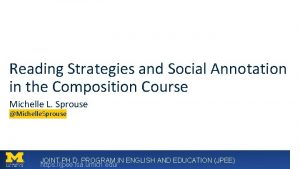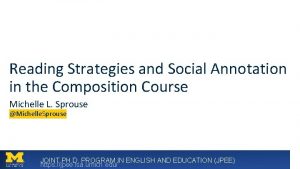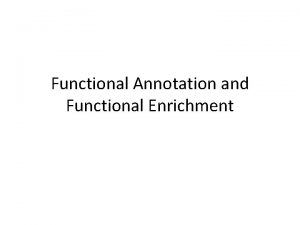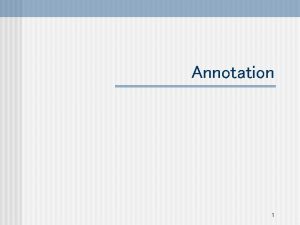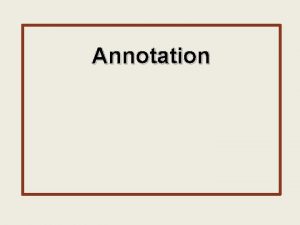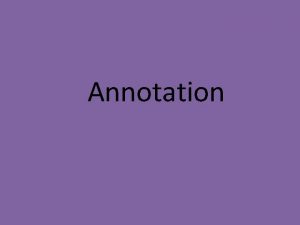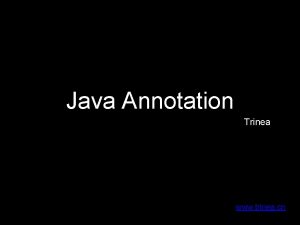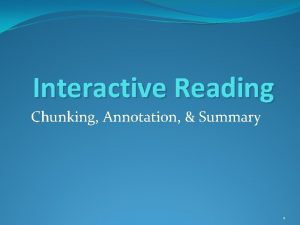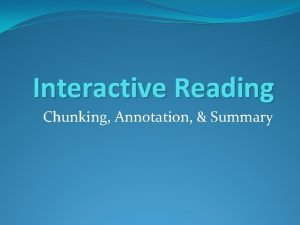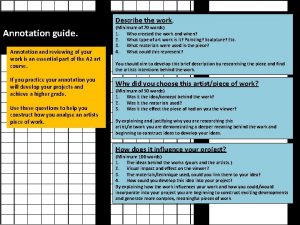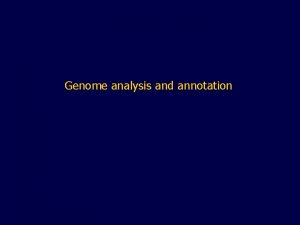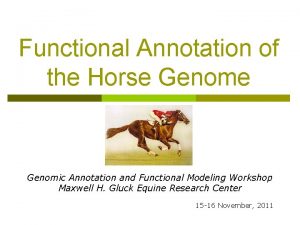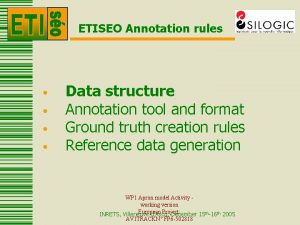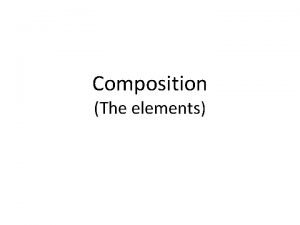Reading Strategies and Social Annotation in the Composition
















- Slides: 16

Reading Strategies and Social Annotation in the Composition Course Michelle L. Sprouse @Michelle. Sprouse JOINT PH. D. PROGRAM IN ENGLISH AND EDUCATION (JPEE) https: //jpee. lsa. umich. edu/

Agenda • • Defining social annotation Theoretical framework Social annotation affordances Social annotation in FYC study Demonstration Best practices Discussion JOINT PH. D. PROGRAM IN ENGLISH AND EDUCATION (JPEE) https: //jpee. lsa. umich. edu/

JOINT PH. D. PROGRAM IN ENGLISH AND EDUCATION (JPEE) https: //jpee. lsa. umich. edu/

tacit invisible explicit visible JOINT PH. D. PROGRAM IN ENGLISH AND EDUCATION (JPEE) https: //jpee. lsa. umich. edu/

Metacognition Meta-knowledge JOINT PH. D. PROGRAM IN ENGLISH AND EDUCATION (JPEE) https: //jpee. lsa. umich. edu/

distance difference (Pintrich, 2002) (Adler-Kassner, 2012; Edwards, 2015; Lockhart & Soliday, 2015) JOINT PH. D. PROGRAM IN ENGLISH AND EDUCATION (JPEE) https: //jpee. lsa. umich. edu/

Social annotation affordances Seeing from a distance • “I’ll just look at what I’ve been thinking about” (Lockhart & Soliday, 2016, p. 30). • Tags track patterns across texts Seeing difference • Compare expert, peer, and own readings in the margins • Replies allow conversations to develop JOINT PH. D. PROGRAM IN ENGLISH AND EDUCATION (JPEE) https: //jpee. lsa. umich. edu/

Context of Study FYC: Writing and Academic Inquiry • Reading-related course outcomes: • • • Participants • • Comprehending content Analyzing rhetorical strategies Adapting reading for specific purposes Using ideas from course readings to support own arguments Situating own writing in conversation with other texts 8 female, 5 male 6 freshman, 4 sophomores, 2 juniors, 1 senior 10 L 1 speakers, 3 L 2 speakers 7 white American, 3 Asian American, 3 Chinese international JOINT PH. D. PROGRAM IN ENGLISH AND EDUCATION (JPEE) https: //jpee. lsa. umich. edu/

Methodology • Hypothes. is embedded in university LMS • 1, 192 annotations archived • Coding • Relationships • “the author”, named, none • “the reader”, specific, self, none • Ways of reading • Comprehension, critical reading, rhetorical reading • Correlation with course outcomes • Directed self-placement (pre-assessment) • Research-based argument (3 rd unit) JOINT PH. D. PROGRAM IN ENGLISH AND EDUCATION (JPEE) https: //jpee. lsa. umich. edu/

JOINT PH. D. PROGRAM IN ENGLISH AND EDUCATION (JPEE) https: //jpee. lsa. umich. edu/

JOINT PH. D. PROGRAM IN ENGLISH AND EDUCATION (JPEE) https: //jpee. lsa. umich. edu/

Emergent themes Text-centered Relationships • Audience awareness • Peer/teacher reading annotations? • Amplification of peer responses Metacognition • “Seeing their ideas and different perspectives helped me to see something that I maybe missed while reading. ” • Authority to annotate for own purposes Meta-knowledge “I am making the goal to do research on the genre and audience of my assignment in order to make it as persuasive as possible. ” • • Expectations of genre and writing in intended fields JOINT PH. D. PROGRAM IN ENGLISH AND EDUCATION (JPEE) https: //jpee. lsa. umich. edu/

Practicing Social Annotation 1. Go to https: //goo. gl/Cb. QLLB 2. Create a Hypothes. is account. 3. Select some text and add an annotation. 4. Try replying to another annotation. JOINT PH. D. PROGRAM IN ENGLISH AND EDUCATION (JPEE) https: //jpee. lsa. umich. edu/

Recommendations for best practices • • Limit group sizes (3 -5 members) Encourage replies Tag annotations with course topics Offer feedback on reading strategies Use controversial moments in class discussions Provide opportunities for rereading annotated documents Choose the annotation tool that best suits your students and instructional purposes: • Ponder. co, Hypothes. is, Diigo, Google Docs JOINT PH. D. PROGRAM IN ENGLISH AND EDUCATION (JPEE) https: //jpee. lsa. umich. edu/

Contact me @Michelle. Sprouse sprouse@umich. edu JOINT PH. D. PROGRAM IN ENGLISH AND EDUCATION (JPEE) https: //jpee. lsa. umich. edu/

References Adler-Kassner, L. (2012). The companies we keep or the companies we would like to try to keep: Strategies and tactics in challenging times. WPA: Writing Program Administration, 36(1), 119– 40. Carillo, E. C. (2015). Creating Mindful Readers in First-Year Composition Courses: A Strategy to Facilitate Transfer. Pedagogy, 16(1), 9– 22. Edwards, M. (2015). Unpacking the Universal Library: Digital Reading and the Recirculation of Economic Value. Pedagogy, 16(1), 137– 152. Gee, J. P. (2008). Social linguistics and literacies: ideology in discourses (3 rd ed). London New York: Routledge. Hypothes. is. (2017). (Version Revision 7 e 14 c 576) [Web]. Hypothes. is Project. Retrieved from web. hypothes. is Keller, D. (2013). A Framework for Rereading in First-Year Composition. Teaching English in the Two Year College, 41(1), 44. Lockhart, T. , & Soliday, M. (2015). The Critical Place of Reading in Writing Transfer (and Beyond): A Report of Student Experiences. Pedagogy, 16(1), 23– 37. Mendenhall, A. , & Johnson, T. E. (2010). Fostering the development of critical thinking skills, and reading comprehension of undergraduates using a Web 2. 0 tool coupled with a learning system. Interactive Learning Environments, 18(3), 263– 276. doi: 10. 1080/10494820. 2010. 500537 Paris, S. G. , & Winograd, P. (1990). How metacognition can promote academic learning and instruction. In B. F. Jones & L. Idol (Eds. ), Dimensions of Thinking and Cognitive Instruction (pp. 15– 52). Hillsdale, NJ: Lawrence Erlbaum Associates. Pintrich, P. R. (2002). The Role of Metacognitive Knowledge in Learning, Teaching, and Assessing. Theory Into Practice, 41(4), 219– 225. doi: 10. 1207/s 15430421 tip 4104_3 Salvatori, M. R. (1996). Conversations with Texts: Reading in the Teaching of Composition. College English, 58(4), 440 – 454. doi: 10. 2307/378854 JOINT PH. D. PROGRAM IN ENGLISH AND EDUCATION (JPEE) https: //jpee. lsa. umich. edu/
 Annotation symbols for close reading
Annotation symbols for close reading Pre reading while reading and post reading activities
Pre reading while reading and post reading activities What is reading and types of reading
What is reading and types of reading What is intensive reading
What is intensive reading What is scanning reading
What is scanning reading Sequence assembly ppt
Sequence assembly ppt Apa itu social thinking
Apa itu social thinking Social thinking social influence social relations
Social thinking social influence social relations 7 comprehension strategies
7 comprehension strategies Phonics for reading anita archer
Phonics for reading anita archer Reading strategies for parents to use at home
Reading strategies for parents to use at home Reading skills definition
Reading skills definition 6 reading comprehension strategies
6 reading comprehension strategies What is absolute language in reading
What is absolute language in reading Visualize predict connect clarify
Visualize predict connect clarify Act reading strategies
Act reading strategies Taking the toeic skills and strategies 1
Taking the toeic skills and strategies 1
